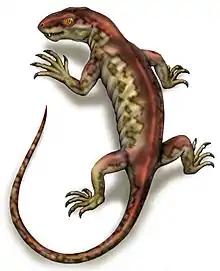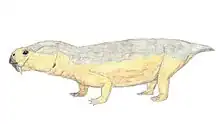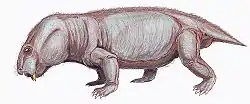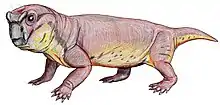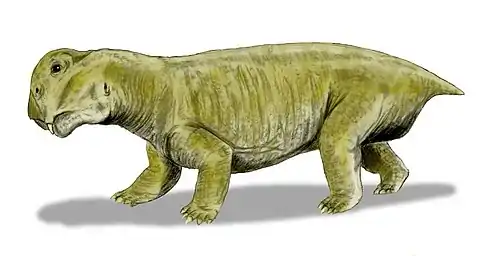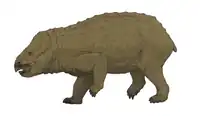Pylaecephalidae
Pylaecephalidae is a family of dicynodont therapsids that includes Diictodon, Robertia, and Prosictodon from the Permian of South Africa. Pylaecephalids were small burrowing dicynodonts with long tusks. The family was first named in 1934 and was redefined in 2009.[1] Diictodontidae and Robertiidae are considered junior synonyms of Pylaecephalidae;[2] although Pylaecephalus itself is considered a junior synonym of Diictodon,[3] the name Pylaecephalidae predates these names and therefore takes priority.[1]
| Pylaecephalidae Temporal range: Permian | |
|---|---|
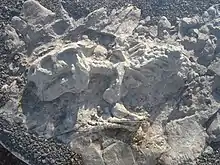 | |
| Fossil of Diictodon | |
| Scientific classification | |
| Domain: | Eukaryota |
| Kingdom: | Animalia |
| Phylum: | Chordata |
| Clade: | Synapsida |
| Clade: | Therapsida |
| Suborder: | †Anomodontia |
| Clade: | †Dicynodontia |
| Family: | †Pylaecephalidae van Hoepen, 1934 |
| Type genus | |
| †Pylaecephalus Van Hoepen, 1934 | |
| Genera | |
| Synonyms | |
| |
References
- Kammerer, C.F.; Angielczyk, K.D. (2009). "A proposed higher taxonomy of anomodont therapsids" (PDF). Zootaxa. 2018: 1–24.
- Kenneth D. Angielczyk; Bruce S. Rubidge (2010). "A new pylaecephalid dicynodont (Therapsida, Anomodontia) from the Tapinocephalus Assemblage Zone, Karoo Basin, Middle Permian of South Africa". Journal of Vertebrate Paleontology. 30 (5): 1396–1409. Bibcode:2010JVPal..30.1396A. doi:10.1080/02724634.2010.501447. S2CID 129846697.
- Sullivan, C., & Reisz, R. R. (2005). CRANIAL ANATOMY AND TAXONOMY OF THE LATE PERMIAN DICYNODONT DIICTODON. Annals of Carnegie Museum, 74(1), 45–75.
- Angielczyk, K. D.; Liu, J.; Yang, W. (2021). "A Redescription of Kunpania scopulusa, a Bidentalian Dicynodont (Therapsida, Anomodontia) from the ?Guadalupian of Northwestern China". Journal of Vertebrate Paleontology. 41: e1922428. Bibcode:2021JVPal..41E2428A. doi:10.1080/02724634.2021.1922428. S2CID 236406006.
This article is issued from Wikipedia. The text is licensed under Creative Commons - Attribution - Sharealike. Additional terms may apply for the media files.
